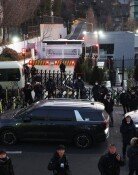Govt Set to Punish 121 Union Leaders
Entering the fourth day of railway workers` strike on June 30, the government and unionized workers have yet to meet face to face to talk, causing the concern over the prolonged crippling of transportation system.
The government has decided to let go 121 union leaders among some 8,000 unionists who have refused to return to work, saying it would punish those who participate in what it sees as an illegal strike.
The labor is also up in arms against the hard-stance government, continuing to hold rallies across the city in five to ten-men groups. The Federation of Korea Trade Unions (FKTU) and the Korea Confederation of Trade Unions (KCTU) are also putting pressure on the government, joining the railway workers` strike.
Meanwhile, traffic was heavy during rush hours on Monday due to the curtailed operations of trains, and the city`s transportation system is expected to be further crippled on July 1 with the Chunggye Highway shut down as a part of Chunggye Stream restoration project.
The Ministry of Construction and Transportation (MOCT) directed heads of 104 regional offices of the Korea National Railroad to punish those who have not return to work.
The government is set to convene a disciplinary committee meeting late night on June 30 after receiving the lists of unionists who refuse to go back to work. It plans to complete deliberation, which usually takes about 20 to 30 days, in 10 to 15 days to punish those engaged in the illegal strike.
The government is determined to mete out strict punishments of more than one-month of suspension to railway workers who have yet to return to work. With only 1,424 of 9,887 striking unionists back to work as of 4:00 p.m. on June 30, 8,463 will be subject to strict punishments, MOCT said.
Labor organizations such as FKTU and KCTU held large rallies in Jongro and Yuido, Seoul on June 30, criticizing what they call the Roh government`s anti-reform labor policy.
Meantime, intervals between trains on some routes in the metropolitan area were extended to 40 minutes on Monday, causing trouble for commuters. Traffic was heavy on outskirt roads leading to Seoul, with many people bringing out their cars.
According to MOCT, train operations in the metropolitan area were 56% of normal at 3:00 p.m., with operations of passenger and freight trains reaching 32% and 9% respectively.
Jae-Seong Hwang jsonhng@donga.com







